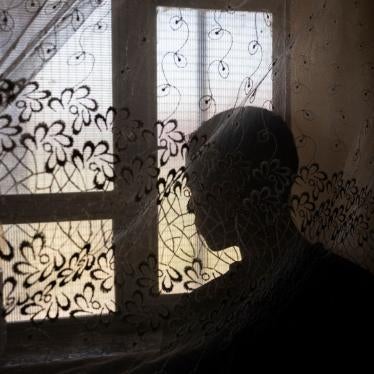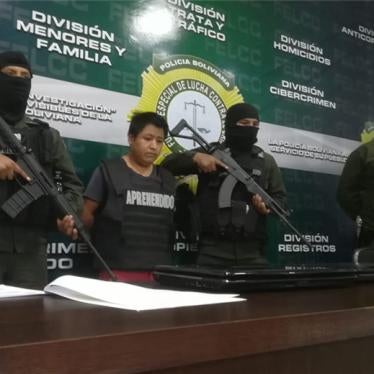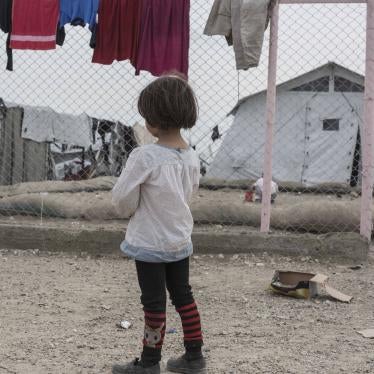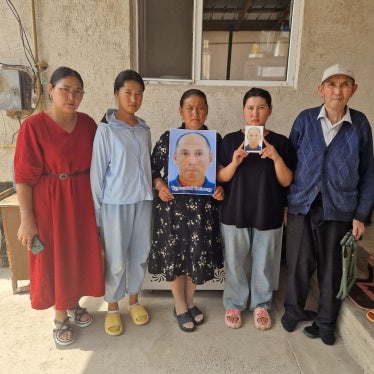The Honourable Vic Toews, P.C., Q.C., M.P.
Minister of Public Safety
Suite 306, Justice Building House of Commons
Ottawa. Ontario
KlA 0A6
Dear Minister:
We are writing on behalf of Human Rights Watch to request that you take immediate
steps to repatriate Omar Khadr, a Canadian citizen currently imprisoned by the
United States at Guantanamo Bay, Cuba, and demonstrate Canada's commitment to
the basic rights of its own citizen, a close and long-time ally, and to the rule of law.
As you are aware, Khadr has been in US custody for nearly a decade. Taken into
custody on July 27, 2002 at age 15, he is the only Western national still held at the
military detention facility at Guantanamo Bay. Khadr remains at Guantanamo despite
Canada's undertaking to the United States in 2010 to facilitate Khadr's repatriation to
Canada, and despite a decision of the Supreme Court of Canada earlier that year
declaring that Canadian officials had been complicit in violating his fundamental
rights.
The need for Canada to urgently repatriate Khadr has long been apparent. After
almost a decade of inaction, the Canadian government agreed in October 2010 to
favourably consider an application by Khadr for return to Canada in diplomatic notes
exchanged with the US in connection with his plea of guilty in a US military
commission proceeding. Khadr's formal application for transfer was submitted to
your offices in the spring of 2011. Even though the US fulfilled its conditions
precedent to his repatriation in April 2012, Canada has not complied with its own
commitment in a timely fashion. Canada is now responsible for every additional day Khadr spends in Guantanamo.
The Canadian Charter of Rights and Freedoms and international human rights law
ensure the right of a national to return to their country. Section 6 of the Canadian
Charter states that, "Every citizen of Canada has the right to enter, remain in and
leave Canada." Article 12(4) of the International Covenant on Civil and Political
Rights, to which Canada is a party, provides that, "No one shall be arbitrarily
deprived of the right to enter his own country." A person imprisoned abroad certainly cannot invoke this right to avoid a lawful punishment. However, given both the
expressed willingness of the United States to return Khadr to Canada, and Khadr's
application to return home, there would appear to be no legal basis for Canada deny
Khadr's prompt repatriation.
After his initial capture by US forces in Afghanistan in 2002, Khadr was detained at
Bagram Airbase for three months. His chief interrogator was a US soldier later
implicated in torturing Afghan detainees to death. Khadr, then only 15 years old, was
subsequently transferred to Guantanamo Bay, denied access to legal counsel for years,
and ultimately charged and tried in the fundamentally flawed military commission
system. At no time was he treated as a child under international human rights or
humanitarian law.
Khadr reported that he had been subjected to torture and other ill-treatment at Bagram
and Guantanamo: Khadr alleged having been shackled in painful stress positions,
threatened with being sent to Egypt, Syria and Jordan for torture, and used as a
"human mop" after he urinated on the floor during one interrogation session.
According to Canadian government documents released by the Federal Court of
Canada, he was also subjected to a severe sleep deprivation technique known as the
"frequent flyer program". In testimony at a military commission hearing, former US
military interrogator Joshua Claus admitted telling Khadr a story suggesting that he
would be sent to a US prison and gang raped. The types of abuse alleged by Khadr,
some of which were confirmed by his abuser, are consistent with other allegations of
torture and ill- treatment made by many other detainees held at Bagram and
Guantanamo.
Rather than requesting repatriation of its citizen to his home country, as did every
other Western nation with a citizen at Guantanamo, Canada became complicit in his
abuse. Canadian officials interrogated Khadr in 2003 with the knowledge that his US
captors had used techniques to facilitate interrogation including weeks of sleep
deprivation. These actions by Canadian officials were declared by the Supreme Court
of Canada in January 2010 to have violated the Charter's principles of fundamental
justice, "offend[ing] the most basic Canadian standard about the treatment of detained
youth subjects". The Supreme Court noted in its decision that a request for
repatriation would be an appropriate remedy to redress the violations by the Canadian
government, declining to order it only as a matter of government comity.
Canada's involvement in Khadr's detention at Guantanamo has not only been sharply
criticised by Canada's Supreme Court, but also by independent international human
rights bodies. Most recently, the United Nations Committee Against Torture, which
monitors state compliance with the Convention against Torture and Other Cruel,
Inhuman or Degrading Treatment or Punishment, condemned Canadian "complicity"
in torture and human rights and stated it is "seriously concerned at the apparent
reluctance on the part of the State party [Canada] to protect the rights of all Canadians
in other countries". The Committee Against Torture also called on Canada to
"promptly approve [Khadr's] transfer application and to ensure that he receives
appropriate redress for human rights violations that the Canadian Supreme Court has
ruled he experienced".
This week, the United States repatriated to Sudan another Guantanamo detainee who
had been prosecuted by a military commission. Ibrahim al Qosi was convicted of
providing material support for terrorism for, among other things, services he provided
to Osama bin Laden first in Sudan and then in Afghanistan. Like Khadr, he entered
into a pretrial agreement which anticipated his repatriation to his home country. Upon
transfer to Sudan, he was released.
Canada's inaction in the case of Omar Khadr has harmed its longstanding reputation
as a country committed to human rights and the rule of law. Canada should reverse
course and honour the diplomatic notes exchanged with the United States, fulfill its
obligations under Canadian and international law to repatriate a citizen, and act to
ensure Khadr's fundamental rights are respected.
We urge you to immediately approve Khadr's application for transfer and bring him
home.
Sean S. Carter
Co-Chair, Network
Co-Chair, Advocacy Committee
c. Jasmine Herlt, Executive Director, Human Rights Watch (Canada)






